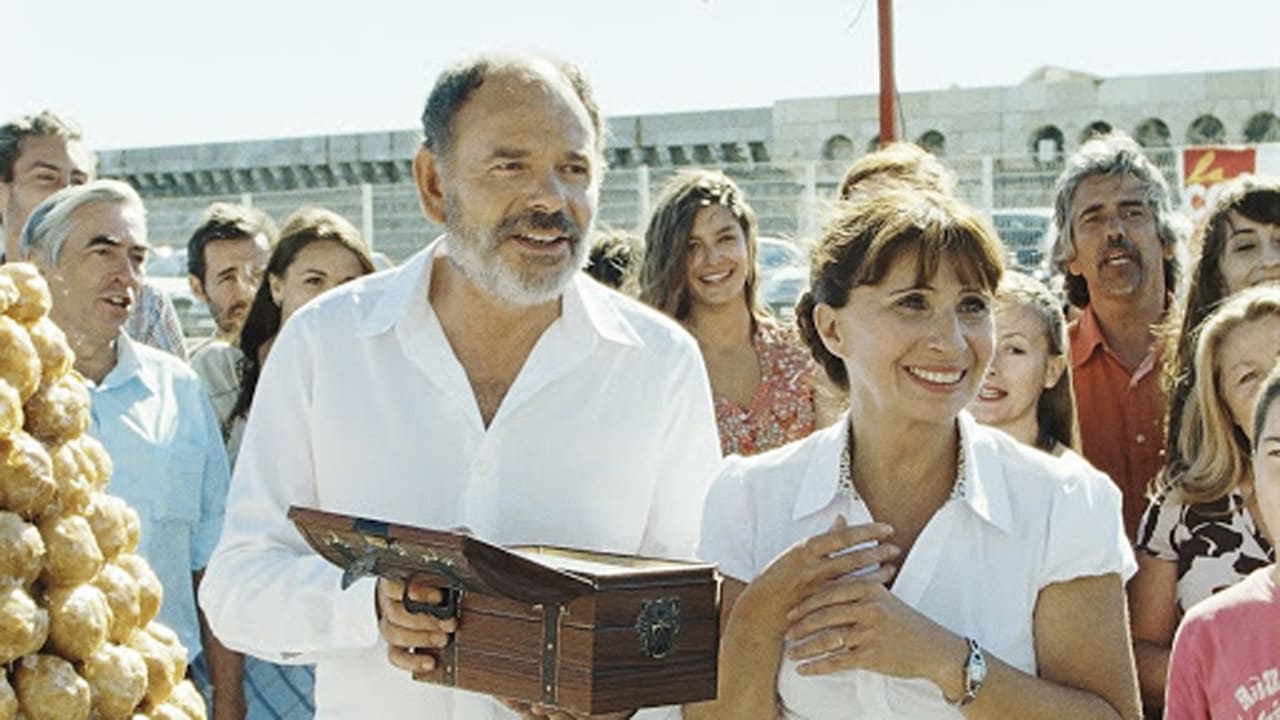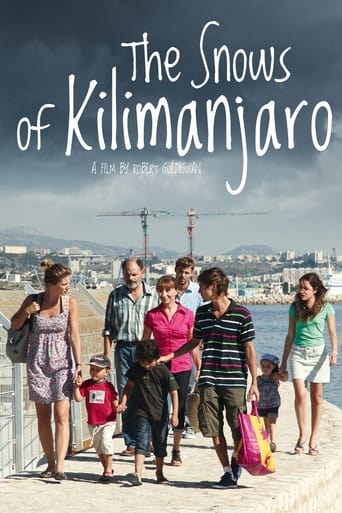Titreenp
SERIOUSLY. This is what the crap Hollywood still puts out?
2freensel
I saw this movie before reading any reviews, and I thought it was very funny. I was very surprised to see the overwhelmingly negative reviews this film received from critics.
Rio Hayward
All of these films share one commonality, that being a kind of emotional center that humanizes a cast of monsters.
Jerrie
It's a good bad... and worth a popcorn matinée. While it's easy to lament what could have been...
dromasca
The 20th century is over and the class wars also seem to be over, or at lease gone through a gradual but radical transformation. Communism may be dead in its Soviet variance, but the unions fights seem to have brought some results in Southern France where the action of 'Les neiges de Kilimandjaro' takes place in what concerns salaries, work conditions, pensions, retirement benefits. Even licensing is now done in agreement between employers and unions, sometimes by means of raffles. Michel, the hero of the film is a union leader, close but still before retirement age who is fired as the result of such a raffle. Yet the social safety net should avoid him a financial crash, and the family net extends the moral support. Michel, his family, his friends look more like an established bourgeois clan than like typical harbor proletarians. The family and friends even gather enough money to send the couple to a safari trip in Africa. All this until a violent robbery deprives them not only of the present, but also breaks into pieces the balance of their apparently accomplished lives, making them to face the realities of a world that does not always know, understand or care about the path and fights they went through in order to achieve the relative balance and happiness ati the older age.The story line told in a very classical linear manner focuses on the price people need to play to justify their happiness. It is not only about having worked and fought to achieve something, but also caring about the realities around. When the intrusion of violence risks to break the dream of their quite bourgeois retirement the response of the couple could also have been violence and rejection of the ignorance of the younger generations. The path taken by the script is however different, Michel and his wife Marie Claire will find in the goodness of their own selves the power to regain the true balance. The story does not avoid the risks of the melodrama, and the fact that it succeeds not to fall into cheapness is especially the result of good acting and low key directing.Director Robert Guediguian works with the same team of actors for quite a while, and this is felt in the natural way the actors move, act, interact. Jean-Pierre Darroussin and Ariane Ascaride are both wonderful, they carry the whole film on their shoulders and make real to the viewers two characters who in many other movies could have looked as too good to be real. Even the ideological lines drawn from texts by Victor Hugo or Jean Jaures are are well controlled and do not appear as too thick and obvious. Thanks to the directing style and fine acting 'Les neiges du Kilimandjaro' has a human touch and is a better film than it could have been.
marcoaponte
After a traumatic incident in their home, we see a trade unionist and his wife, hard-core socialists, questioning the turn their lives have taken over the years, too comfortable, too middle-class. Have we become like those rich people we used to fight? they wonder. Set in Marseilles, this story is compelling, cleverly structured, and very moving. Performances are outstanding, particularly from the two leads: Ariane Ascaride as Marie Claire and Jean Pierre Darrousin as Michel. They wonder about the choices they made, the confront their own children, and they make new choices trying to recover their lost passion for equality and class struggle. Photography is beautiful and includes several shots of the Marseille Harbour. I saw this film on Saturday 15 September 2012 at the Prince Charles in London as part of the London Labour Film Festival.
writers_reign
In the sense that both have a penchant for introducing politics into films it could be argued that Robert Guidiguian is a Gallic Ken Loach but the link is tenuous at best for whilst Loach is only happy when clubbing the audience over the head with his tainted vision - Look, see what the bastard English are doing to the Saintly too-good-to-live IRA - Guidiguian is more subtle so that his viewpoint manifests itself wafting gently as a hint of Arpege through a boudoir keyhole. And Loach, of course, does not have access to and probably would sneer at talents like Gerard Meylan, Jean-Pierre Darroussin and the outstanding Ariane Ascaride - indeed it's fair to say that no English actress of her generation can illuminate a scene or a room like Ascarides and we have to turn to the next generation and Vanessa Redgrave to come close. This is yet another Marseille-based fable and this time around Larroussin is the Union official who, in the interests of fairness and solidarity, enters his own name in a draw to nominate 20 workers who will be dismissed to cut labor costs. Alas, one of the twenty sees fit to rob Larroussin along with his wife and sister and brother-in-law. The robbers are masked and quite by chance Larroussin discovers the identity of his ex-colleague. At this stage Guidiguian introduces his main themes; the young worker sees only that Laroussin is 'middle-class', drives a car, dines in restaurants, watches television and assumes that it has always been this way. He has no concept that Larroussin was once working-class and fought to enjoy a better life not just for himself and his family but for all the workers in the shipyard who he represented. The young colleague does not know his father, his mother has no interest in either him or his two much younger brothers and in fact he spends his share of the proceeds of the robbery to pay household bills and treats for his siblings. Larroussin withdraws the charges but it is too late to stop the wheels of justice; independently at first and then in concert, Larroussin and wife Ascaride extend practical help to the young siblings of the man who robbed them. With any other cast and any other director (Loach, for instance) this would be unpalatable propaganda but with this cast and this director it emerges as a wonderful Capra-esque feel good movie. Highly recommended.
stensson
What is solidarity? Solidarity in the union way? It seems easy in the beginning of this film, even if it's a decision which is to your own disadvantage. People have to go from the factory, there's a lottery and this union leader is among them. He didn't want any special treatment.But this thinking and feeling is challenged, when one of his coworkers robs him and his wife. Why did he do that? It's a result of compromises from the union, leaving the robber and his kid brothers in misery.So the screw is turned. Do you want revenge or do you blame yourself for lacking solidarity? The problem is solved in a way which shouldn't be mentioned here, but the answer is much easier than the questions.

